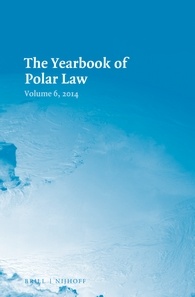The sixth edition of the Polar Law Yearbook is now available at Brill.

Since 2009, when the first Polar Law Symposium was held in Nuuk, the Polar Law Yearbook collects together articles written by different authors on Arctic and Antarctic issues. While some of the articles are submitted directly to the Yearbook, others are based on presentations made at the Sixth Symposium on Polar Law that was held in Akureyri, Iceland, in October 2013.
Editors-in-Chief: Professor Gudmundur Alfredsson, University of Akureyri, Iceland, and China University of Political Science and Law,
Professor Timo Koivurova, Northern Institute for Environmental and Minority Law, Arctic Centre, University of Lapland, Finland. Special Editor: Hjalti Ómar Ágústsson, University of Akureyri, Iceland.
The Yearbook of Polar Law, is based at the Faculty of Social Sciences and Law at the University of Akureyri in Iceland and the Northern Institute for Environmental and Minority Law (Arctic Centre/University of Lapland) in Finland and covers a wide variety of topics relating to the Arctic and the Antarctic. These include:
- human rights issues, such as autonomy and self-government vs. self-determination, the rights of indigenous peoples to land and natural resources and cultural rights and cultural heritage, indigenous traditional knowledge,
- local, national, regional and international governance issues,
- environmental law, climate change, security and environment implications of climate change, protected areas and species,
- regulatory, governance and management agreements and arrangements for marine environments, marine mammals, fisheries conservation and other biological/mineral/oil resources,
- law of the sea, the retreating sea ice, continental shelf claims,
- territorial claims and border disputes on both land and at sea,
- peace and security, dispute settlement,
- jurisdictional and other issues re the exploration, exploitation and shipping of oil, gas and minerals, bio prospecting,
- trade law, potential shipping lines through the northwest and northeast passages, maritime law and transportation law, and
- the roles and actual involvement of international organizations in the Polar Regions, such as the Arctic Council, the Antarctic Treaty System, the European Union, the International Whaling Commission, the Nordic Council, the North Atlantic Treaty Organization, and the United Nations, as well as NGOs.
